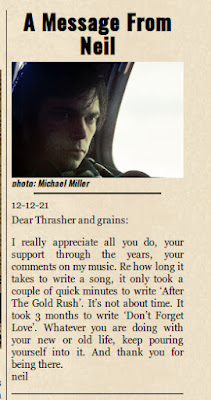INTERVIEW: Neil Young - SPIN 1993 Artist of the Year
This past weekend, we posted a discography overview titled "Every Neil Young Studio Album, Ranked" | UPROXX by Steven Hyden which contained a quote we were not familiar with:
Neil Young: “I know that the sacrifice of success breeds longevity.
That’s an axiom. Being willing to give up success in the short run ensures a long run.”
The quote sparked an interest in tracking down the SPIN interview when Neil Young was named "1993 Artist of the Year". The interview originally appeared in SPIN’s January 1994 issue.
Neil Young: [in response to his mid-’80s albums] “I was doing things that didn’t really commit me one way or the other.
I think I was disillusioned with a lot of things— [I was disillusioned ] with life.
For whatever reason, I chose to disguise the music, and keep everything inside the music, and not reach out, do things in styles that I knew would piss everybody off so nobody would even buy it or listen to it.
I don’t make excuses for those records. I think those records are going to stand up, in time.
I don’t feel the records are not as good as the records I’m doing now. I just feel that they’re not aimed at success—in any way. Yet if you put them on a wall—I look at them as if you’re walking through a museum. You see somebody’s paintings. You go, ‘Wow, look at this period here! Is this weird!’
Especially considering what came after it and what was before it. And then you have to look at ‘Well, during that period, what was the artist doing?’—and even knowing what he was doing, no one knew what was going to follow.
Obviously [in my case], people considered nothing was going to follow. This was the end.”
Full SPIN interview with Neil Young when he was named "1993 Artist of the Year".
Incidentally, so why exactly did SPIN Magazine name Neil Young their 1993 Artist of the Year? Because, to quote: "If the 48-year-old Young can be named Artist of the Year for 1993, it’s not only because of what he’s done over the last 12 months or so, but because of the extraordinary fusion of weight and grace in his work of the last four years."
For more on Neil Young 1980's albums, see ‘Trans’: An Album So Controversial, The Label Sued Neil Young Over It: Revisiting The Legend’s Robot Rock Opus.
Also, see Reassessing Neil Young's Geffen Records Years.
Labels: album, interview, neil young


































 Human Highway
Human Highway

















 Concert Review of the Moment
Concert Review of the Moment





 This Land is My Land
This Land is My Land

 FREEDOM In A New Year
FREEDOM In A New Year









 *Thanks Neil!*
*Thanks Neil!*




![[EFC Blue Ribbon - Free Speech Online]](http://www.thrasherswheat.org/gifs/free-speech.gif)











 The Unbearable Lightness of Being Neil Young
The Unbearable Lightness of Being Neil Young Pardon My Heart
Pardon My Heart



 "We're The Ones
"We're The Ones  Thanks for Supporting Thrasher's Wheat!
Thanks for Supporting Thrasher's Wheat!




 This blog
This blog 
 (... he didn't kill himself either...)
#AaronDidntKillHimself
(... he didn't kill himself either...)
#AaronDidntKillHimself









































































 Neil Young's Moon Songs
Neil Young's Moon Songs




 Civic Duty Is Not Terrorism
Civic Duty Is Not Terrorism Orwell (and Grandpa) Was Right
Orwell (and Grandpa) Was Right


 What's So Funny About
What's So Funny About 



3 Comments:
Really interesting when you focus on it: the records were not "aimed at success in any way." Clearly, he was on a journey and one that was at least as dark, if not darker, than the ditch trilogy. At the time, it wasn't at all clear that he would re-emerge. He did re-emerge and as an inconceivable force: e.g., the saturday night live attack. Who would have thunk it? Zuma was light after the darkness, though soaked in a booze. Freedom was deep and frightening in places, he re-emerged wiser and tougher.
perhaps there is a lot of confusion around these "bad albums"? If we lived in a world that found true gratitude for art and the artist, we might see these diversions and journeys and what makes everything else possible? They are necessary conditions for the next step, like a dialectic in process and the process is not over.
I always see those Geffen albums similar to Neil - paintings almost, a reflection of a time when things where fawned over and finished in a certain manner, and some were just sketches to get em out there before they are gone. Collections of paintings go together much like this over a lifetime of work.
Post a Comment
<< Home